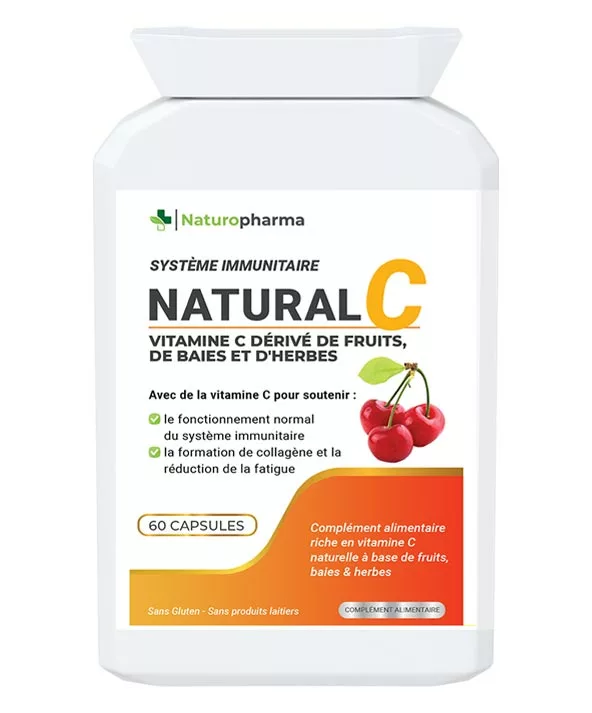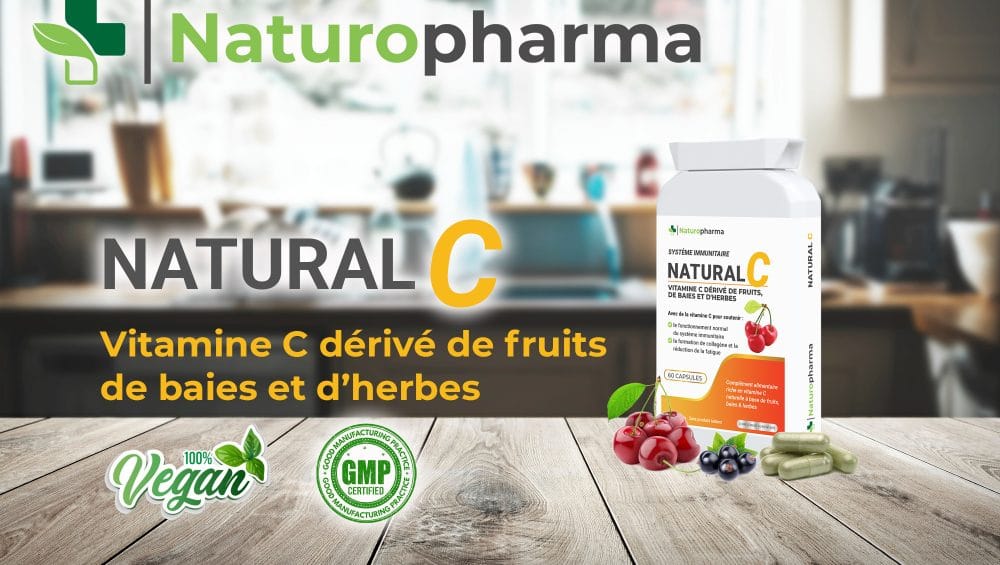
The human body has difficulty recognising synthetic substances, including vitamins.
It is better able to process and assimilate nutrients from natural whole foods. However, as the quality of food declines due to (for example) mass production and processing, the incidence of multiple micronutrient depletion continues to rise, along with associated health conditions.
Food supplements offer a practical and effective way of supplementing vitamin and mineral intake, as they present the nutrients in a form as close as possible to the whole food in which these micronutrients are naturally found.
Natural-C is a unique whole-food source of vitamin C, derived from some of nature's richest foods. As well as providing vitamin C, Natural-C contains a host of other natural vitamins, minerals, antioxidants, bioflavonoids, pectins, carotenoids and other phyto-nutrients.
Mild and non-acidic - no ascorbic acid!
La vitamin C Synthesised vitamin C (normally in the form of ascorbic acid and mineral acsorbates) may resemble vitamin C in its chemical structure, but it lacks the natural and essential co-factors found in dietary products. This vitamin C combination is made up of natural food ingredients, as recognised and required by the body for maximum digestion, absorption and use.
This natural combination is also one of the few vitamin C supplements that: is not rapidly excreted by the body and easily absorbed (a lower intake is required), is not acidic - many people cannot tolerate citrus-based supplements, which can aggravate certain medical conditions.
Immunity
Collagen formation
Blood vessels
Bone and cartilage
Good for :

Skin, gums and teeth
Energy levels
Nervous system
Oxidative stress
Iron absorption
About the ingredients...
Acerola cherry: Acerola cherries are known as superfruits because of their excellent nutritional value. and their exceptionally high vitamin C content. C. Vitamin C is essential for cell growth and repair and for a strong immune system. Acerola cherries are a source of naturally bioavailable and potent vitamin C, which is fully utilised by the body, unlike synthetic ascorbic acid, which is sold as vitamin C.
To compare vitamin C content with other fruits, a small acerola cherry contains around 80 mg of vitamin C, 30 times the amount found in oranges (of the same weight).
These cherries have an astonishing array of nutrients, including powerful antioxidants. In fact, researchers have identified almost 150 nutritional constituents, including bioflavonoids, proteins, minerals, iron, calcium and phosphorus. This undoubtedly makes the acerola cherry one of the most nutritious fruits we know.
Cassis: Also considered superfruits because of their wide range of nutrients, blackcurrants were used during the Second World War as a replacement for oranges and other vitamin C-rich fruits. These berries are extraordinarily rich in vitamin C and are far superior to oranges, containing more than three times as much of this powerful antioxidant.. They are also rich in calcium, potassium, phosphorus, iron, phyto-nutrients, vitamins and minerals. vitamin E and other antioxidantsincluding anthocyanins, a type of polyphenol. Blackcurrants are an excellent energy source and their seeds are rich in unsaturated fatty acids. They can also help prevent joint inflammation, eye strain and urinary tract infections.
A recent scientific study has revealed that the chemicals and natural compounds present in blackcurrants may contribute to balancing the impact that exercise can have on the body. Researchers in New Zealand have also discovered a compound that could help improve breathing in certain types of asthma. British scientists are currently studying how blackcurrant could be the key to helping to slow the progression of Alzheimer's disease.
Rosehip: Rosehips are red fruits found on roses. They are an excellent source of vitamin C and bioflavonoids. There is as much vitamin C in one cup of rosehip pulp as in 40 oranges. ! Vitamins A, B1-3 and K are also present. The bioflavonoids present in the pulp and peel of the fruit act synergistically with vitamin C, improving its absorption rate.
From a health point of view, rosehips are best known for their high content of bio-available vitamin C.
There are around 1,700 mg of vitamin C in 100 g of dried rosehips. Studies show that rosehip can reduce the symptoms of osteoarthritis and help the joints to work better.
This fruit is certainly no stranger to the world of alternative medicine and could be described as a nutritional superstar thanks to its high iron and vitamin content. It has even more antioxidant potential than bilberries!
Parsley leaf: A highly nutritious member of the Umbelliferae family, parsley offers numerous health benefits and a host of nutrients, including vitamins A, C and E, bioflavonoids, iron, folic acid, volatile oils, coumarins, flavonoids, chlorophyll and other powerful antioxidants and phyto-nutrients.
Parsley contains more vitamin C than any other culinary vegetable, i.e. around three times as much as is contained in an orange and around the same amount as an orange.
than blackcurrants. It has a high iron content (around twice that of spinach) and is also a good source of manganese, calcium and potassium.
Raw parsley and its juice are used to purify the blood, dissolve sticky deposits in the veins, help maintain the elasticity of blood vessels, help break down small kidney stones and gallstones and as a natural breath freshener and diuretic.
Elderberry: The elderberries are rich in vitamins A and B, flavonoids and potassiumBut they are especially remarkable because they contain more vitamin C than most other fruits (with the exception of blackcurrants and rosehips)!
Research indicates that they promote resistance to disease, which explains their traditional use in the treatment of colic.
Hence their traditional use in the treatment of colds, viral infections and upper respiratory tract ailments (including asthma). They are also said to help reduce cholesterol, improve vision, support heart health, improve symptoms of diabetes, improve digestion, relieve muscle pain, relieve symptoms of arthritis, act as a mild laxative and diuretic and support immunity.
In fact, the anthocyanins present in elderberries have a greater antioxidant capacity than vitamin E or vitamin C!
These powerful antioxidants improve immune function by stimulating the production of cytokines - proteins that act as 'messengers' in the immune system to help regulate the immune response.











